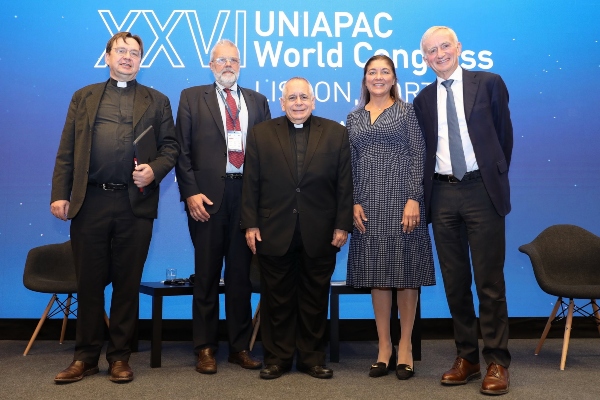Abordando los retos del futuro del trabajo (27 Junio 2019, Lisboa)

Traducir:
Addressing the Challenges of the Future of Work
Between the 22nd and 24th of November 2018, UNIAPAC held its 28th World Congress on how to achieve the goals of “promoting business as a noble vocation, seeking the personal transformation of the business leader, building a more humane organizational culture, and businesses serving the common good”.
This international group of Christian business leaders seek to transform how work is seen and done so that the promotion of the common good is central instead of solely profit. UNIAPAC was born in 1931 as “Conférences Internationales des Associations de Patrons Catholiques”, and in 1962 becomes an ecumenical association under a new denomination: International Christian Union of Business Executives. Today, it gathers Christian Business Leaders Associations in 36 countries in Europe, Latin America, Africa and Asia representing 16.000 business executives working in various leading sectors of the world economy.
One of the panels titled “Addressing the Challenges of the Future of Work”, was opened and moderated by Msgr. Robert Vitillo, Secretary General of the International Catholic Migration Commission who discussed the idea of labour being a key factor in social justice and the need for decent work and decent wage for all. Furthermore, he mentioned the main factors influencing the change in work from the environmental crisis, the technological changes, and as he put it “the migration opportunity”. He then mentions “The Future of Work, Labour after Laudato Si” global project and its role among the Catholic inspired organizations that have often been involved in advocacy at the International Labour Organization (ILO).
The first speaker was Mr. Pierre Martinot-Lagarde of the ILO, who focused on the idea that there are many different facets of societal labour issues, they are all fundamentally related in a very complex manner, but we cannot force them into one conglomerated issue. If we look at the changes from 1900-2000, the changes in our society were vast, so why would we expect any less amount of change in the next century? He thought that the key behind a successful change wasn’t the change itself, but how we go about it. He argued that we shouldn’t force change into being a right- or left-wing issue, or even an ideological one, but instead focus on discussing and working together looking for common ground and common solutions.
The second member of the panel was Ms. Silvia Taurozzi, who gave a quote from McKinsey & Company saying, “in the next fifteen years up to 30% of jobs will be replaced by automation”. This would be the equivalent of 400 million people who would be replaced in just fifteen years. While this is obviously a troubling number, Taurozzi stated that she believed that this was an opportunity for businesses to reinvent themselves, potentially for the better. She then gave a list of several different areas she believed that we need to do in order to help facilitate this change for the better. One area she thought was very important was in addressing income inequality. Another, the massive work needed in being able to reskill workers to fill the appropriate new positions that would be created, along with the old ones that would become redundant. She finally closed on the point that we would need to drive new policy forward, and while this would not be an easy or pleasant task, stressed how important it was to do this. She pointed out the potential role that non-governmental organizations (NGOs) could play in helping to create this policy.
The third speaker, Mr. Denis Duverne of the AXA Group, spoke from the point of view of a large business, discussing how organizations should conduct themselves in order to benefit all instead of just the corporate leaders. He, like Taurozzi, examined how many jobs would shift into new skill areas in the coming years. However, he also talked about how important it was to maintain the wellbeing and mental health of employees in a day and age when we are potentially connected and reachable 24/7. He discussed strategies AXA implement to avoid over taxing and burning out employees. He stated that companies should never lose sight of “their noble purpose” such as AXA’s of providing aid to their clients when insurance claims were needed. He parted with the idea of rooting the company in the local community, encouraging local volunteer work and donating excess profit to local charities in order to foster good relations.
The last speaker of the panel, Prof. Paul Dembinski from the Fondation L’Observatoire de la Finance (OBSFIN), shifted from thinking about the future challenges of labour, to thinking about the challenges of labour we do not see today. He stated that while we know a lot about work, specifically work in western nations, “30-40% of all work is outside of statistical or economic knowledge”. Work such as household work, and self –subsistence farming would be included in many definitions of “decent work” but have very little data gathered on them. He also mentioned the idea of “shadow work”, which isn’t work in and of itself, but time lost to work such as sitting in traffic while commuting in. Finally, he discussed the lack of terminology for enterprises since the goals, issues and problems surrounding a macro scale organization of 100,000 people, is very different than a small startup of five.
Changing how we view work as a society is not an easy task, even if the goals of promoting “decent work” or “vocations as being noble” are beneficial to society as a whole. If we are not ready to surpass the challenges of tomorrow, we will be unable to achieve an inclusive future for all.

